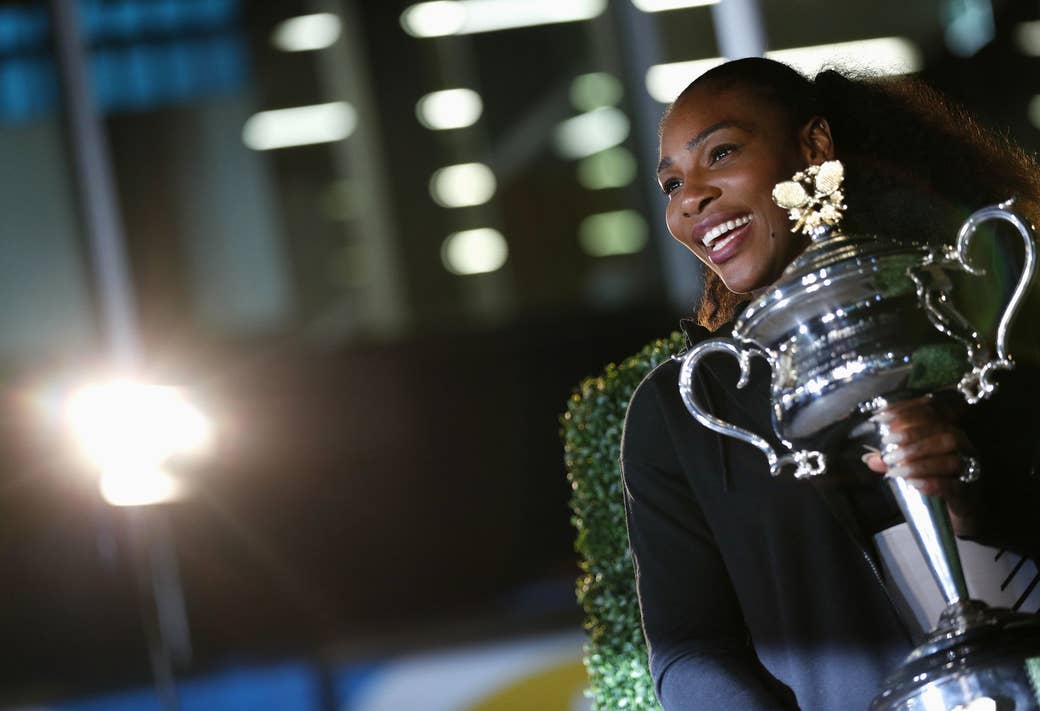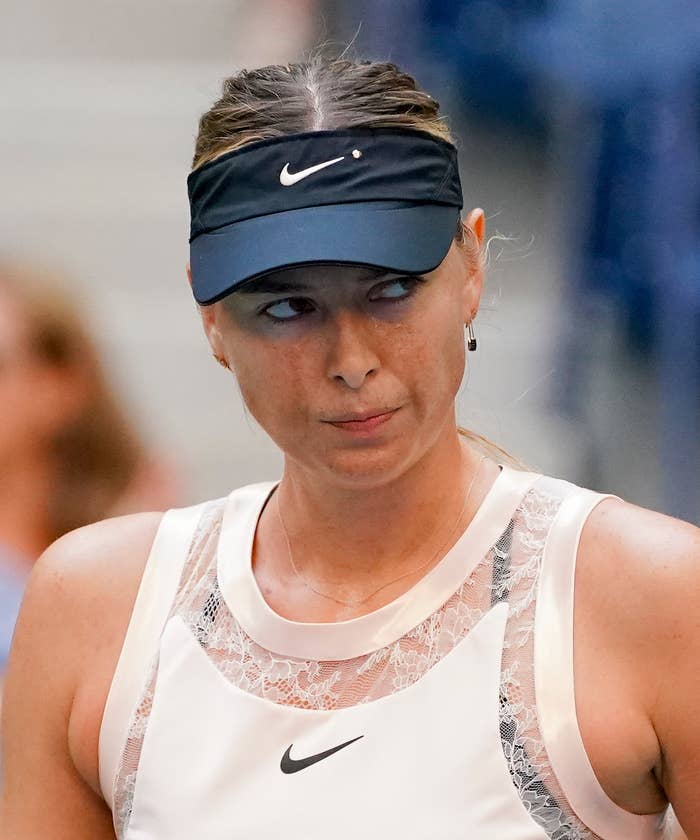
The language of racism has long been a slippery thing. It maneuvers like a greased pig, sliding out of the grasp of those who would like to hold it up as egregious, and runs along merrily, dodging responsibility all the while. It is how we got to calling for “law and order” and how we get away with calling for the annihilation of “thugs” in political speeches on both sides of the aisle. It is how a section of us gets to say with a straight face, “I’m not racist” and truly believe it. "Where was the N-word?" people will ask, obtusely. At this point, it doesn’t need to be present to make itself felt.
The ideology of white supremacy ends lives, as the evidence of hundreds of years attests. But even where it does not actively kill, it commits smaller, more insidious crimes, too. It belittles and dismisses humanity and accomplishment, and it does so by using words that appear to be innocent of illogical animus.
In reading excerpts from Russian tennis player Maria Sharapova’s new memoir, Unstoppable, it would be reasonable to see the reality of her situation: an athlete humiliated and angered by a far superior opponent over the years. But there is also an inescapable undercurrent of bitterness that relies on something more sinister when it comes to discussing the No. 1 player in women’s tennis, Serena Williams.
“First of all,” Sharapova writes, “[Williams’] physical presence is much stronger and bigger than you realize watching TV. She has thick arms and thick legs and is so intimidating and strong.” Focusing on people’s bodies is par for the course in sports — there are inescapable requirements to do what athletes do. And the fact of the matter is that Serena Williams is strong. You have to be, to be perhaps the best athlete in the world, pound for pound. But Sharapova’s description has nothing to do with Serena’s world-straddling skill and ability. It is about setting her up as “other,” as superhuman (but in the detrimental way that curls into itself and reemerges as subhuman) and therefore unfair and unworthy to be in that space, on that court.
Thick arms and thick legs (coded as masculine) in addition to being intimidating (“I felt threatened, officer”) and strong (read: too strong, ergo masculine)? Well, that’s too much. How could I, a slender blonde, be expected to play against this, and win? Never mind that at 6’2”, Maria Sharapova stands a clean 5 inches above Serena Williams’ 5'9" frame. Sharapova painted a shorthand cultural picture we have come to understand very well, in which a dainty white lady is menaced by a hulking black specter. It’s fake news. Misogynoir both coded and explicit. But the facts are meaningless here, because this narrative is too compelling.
The Williams sisters, and Serena especially, are no strangers to having their bodies and ability discussed in othering ways over the years. In 2012, Danish tennis player Caroline Wozniacki “impersonated” Serena at an exhibition match in Brazil by stuffing the front of her top and the back of her skirt with towels. (Novak Djokovic’s done similar, as has Andy Roddick.) Serena’s response to her friend Caroline’s action was to say she doubted there was anything racist about the actions (various publications lined up to tell concerned readers emphatically that it was not racist) but, in an email to USA Today, she added, “I must add if people feel this way she should take reason and do something different next time.”
Both Williams sisters have been likened to men for the absolute power of their serves, and due to that style of play, they are rarely afforded credit for playing with nuance or strategic tactics. In 2014, the president of the Russian tennis federation, Shamil Tarpischev, called the sisters “the Williams brothers” and “scary.” A year earlier, after losing to Serena at the French Open finals, Sharapova had stated it baldly. “[Serena] has no pressure going in and serving and being up a break at 5–4, and serving harder than David Ferrer when he gets to the final of Roland Garros,” Sharapova said in the after-match press conference. “I mean, I think if I was built like Serena I hope I'd be able to hit a big serve like that, too.”
Remember: There are 5 inches of air between Sharapova and Williams, and the latter is five years older, in a sport where age is a liability and precocious wunderkinder are fetishized. (Sharapova was one; she ascended into international stardom at the age of 17, when she beat Serena at the Wimbledon final in 2004, one of only two times this has happened.) Lastly, I urge you to remember that between Williams and Sharapova, only one has been the recipient of a two-year ban for using the banned substance meldonium. That was Sharapova. In an interview with Net-A-Porter magazine, Sharapova brings up her decision to include the ban in her memoir. "I talk about it with a lot of vulnerability and rawness. How it made me feel; how I felt like the world looked at me; how I felt so small. For a woman who’s tall and powerful — an athlete — it was a very distant feeling.”
The dog whistle was deafening. I am playing by the rules, and she is not. Except Serena is. She always has. She’s simply better.

The narrative of the alleged Williams-Sharapova rivalry was orchestrated by fate, in which a young upstart unseats the more established incumbent, as Sharapova did to Williams at Wimbledon in 2004. But what happened after that match failed to truly live up to that setup. A true rivalry would suggest a more balanced stats board than their match history actually gives us. Look at McEnroe and Borg (7–7), or Evert and Navratilova (37–43). Hell, even S. Williams and V. Williams (17–11) offers up something more equal. No one is denying the competitiveness. But a 19–2 W-L ratio is not a paragraph, and it is not even a chapter, let alone a whole book. It’s a sentence.
What needed to be proven has been, convincingly and repeatedly. But because we need certain lies — a world in which the willowy tall blonde wins at life, for example — we have allowed a narrative to form in which the two are evenly matched. Or at the very least, we have maintained conditions that have allowed Sharapova to profit from this line of thought. If they ever were truly equal in terms of sporting ability, that window was fleeting, and the evidence bears this out.
Sharapova posits a theory in Unstoppable as to the root of Serena’s apparent problem with her. She refers to that first time she beat her, when Serena had been the tournament favorite. She overheard Serena crying over the loss, says Sharapova, and “I don't think she's ever forgiven me” for witnessing this “low and vulnerable moment.” She expands on this by writing, “I think Serena hated me for being the skinny [emphasis mine] kid who beat her, against all odds, at Wimbledon. I think she hated me for taking something that she believed belonged to her. I think she hated me for seeing her at her lowest moment. But mostly I think she hated me for hearing her cry. She's never forgiven me for it.”
It’s ironic that Sharapova says Serena believed that win “belonged” to her. Because history’s quite clear on who has traditionally gotten to advance in the sport of tennis. The Williams sisters broke into a lily-white field when they went pro back in 1994 and 1995, and were subjected to their share of racist abuse. Their emergence as champions (and specifically Serena’s absolute dominance in latter years) was not the norm, and some tennis fans as well as establishment figures have made that clear to them every step of the way. When Sharapova writes, “This is a story about sacrifice, what you have to give up. But it’s also just the story of a girl and her father and their crazy adventure,” you could say the exact same thing about Serena Williams. But that’s not the narrative she’s allowed to inhabit, is it?
The projection here is also worth noting. Sharapova reminds one of the 2014 essay by Jen Caron, in which the writer got caught up in the imagined inner thoughts of a co-yogi, a “heavyset black woman” and wondering what she could do to “help her.” And it also brings to mind the white women mentioned in "White Women Drive Me Crazy," Aisha Mirza’s 2017 essay, who mask jealousy with faux concern, because their discomfort makes them feel powerless. She writes, “They say, 'Are you okay?' instead of 'I feel uncomfortable,' because they are not used to feeling uncomfortable and they are happy for us to be the problem instead.”
In Unstoppable, Sharapova writes of Serena, “Even now, she can make me feel like a little girl,” and one has to ask, Is that a Serena problem, or a you problem? Consider that what you are feeling is your own personal lack. Sharapova’s feelings of fear and shame and disappointment are natural, and very real. But that may muffle the very real dog whistle her words conjure. And while it’s probably unconscious that she reaches for those specific terms and words when it comes to detailing her own inadequacies, that doesn’t mean it’s OK.
In the meantime, the jig is up. The US Open final this weekend will feature two American women; one black (Sloane Stephens, who beat 37-year-old Venus Williams to get there) and one biracial (Madison Keys, who does not call herself black). Serena’s on maternity leave, but the future of American tennis (at least) is irrevocably in black women’s hands.
Let that be what scares you and makes you better.
